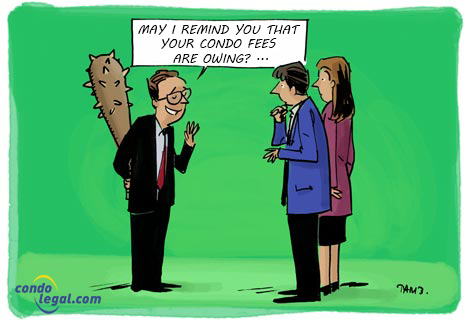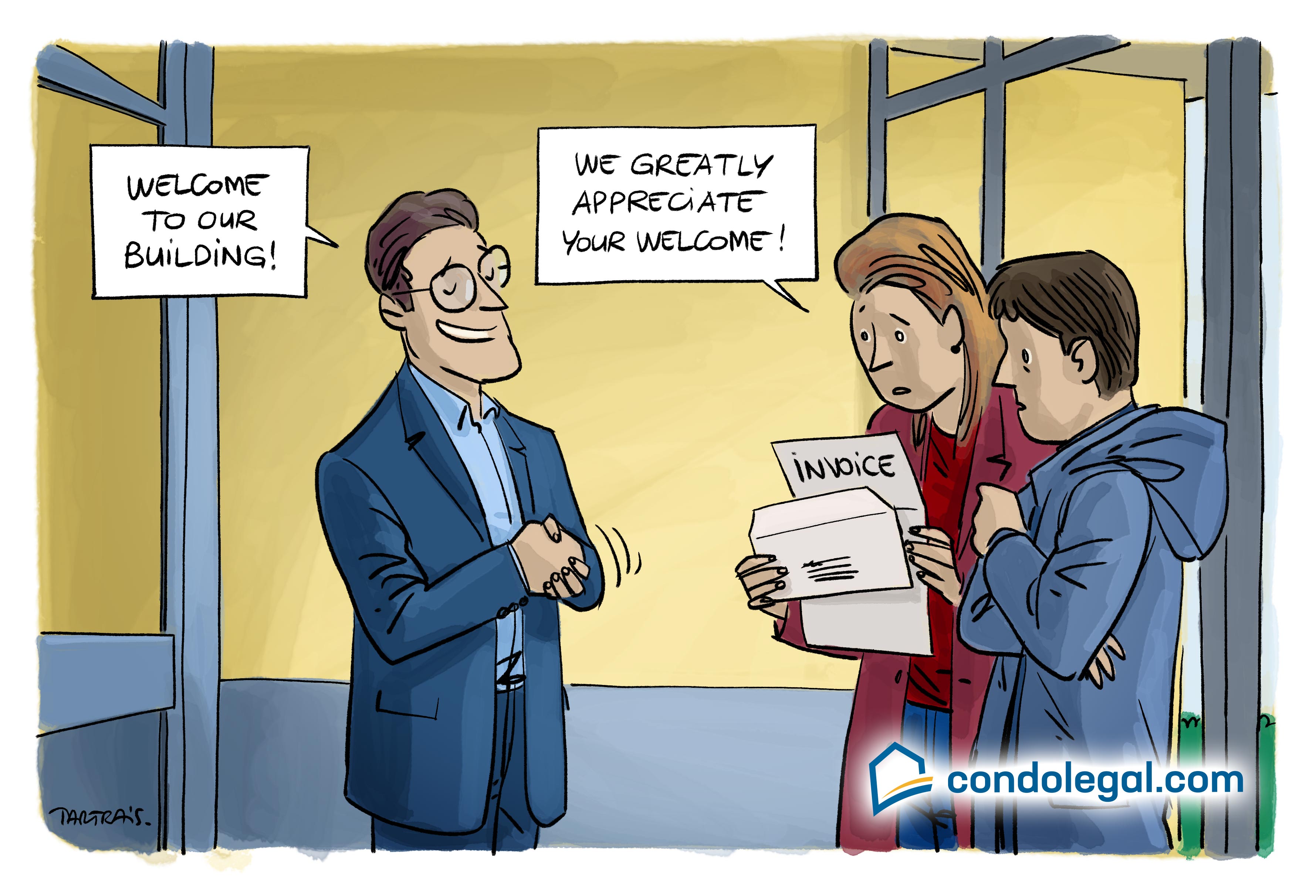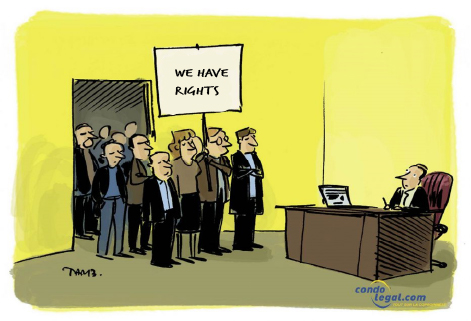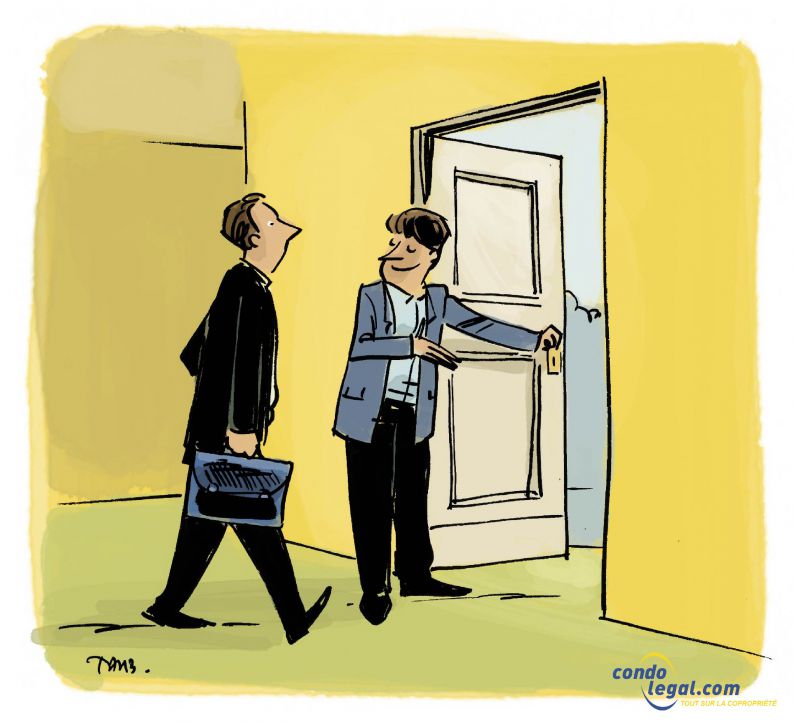Date published: 30/06/2024
Collection of the unpaid common expenses

The failure to pay general or special common expenses (condo fees) is one of the most contentious co-ownership’s issues. It is the duty of the board of directors of the syndicate of co-owners to collect them, unless this task has been delegated to the condo manager.
When a co-owner's contributions have been in arrears for more than three months, the law provides, ex officio, that he automatically loses his right to vote at the general meetings of the co-owners. He is also exposed to legal recourses, so that the syndicate can recover the unpaid expenses. A review of the options in such cases.
Sending a notice of default
This document takes the form of a letter signed by a lawyer. It will generally be sent to the delinquent co-owner by registered mail, or by bailiff, to provide proof that it has been received by the recipient. This formal notice will ask for the payment of amounts owing. But in the event that it does not give any result, lateness-interest may accrue from the date of service of the notice of default. As for the costs, if the declaration of co-ownership allows it (penal clause), the professional fees of the lawyer may also be claimed from the co-owner at fault in addition to the common charges due. In addition, the syndicate is not required to send a copy to the hypothecary creditor of the co-owner, unless the declaration of co-ownership provides for it. In addition, the syndicate is not required to send a copy thereof to the hypothecary creditor of the co-owner, unless the declaration of co-ownership so provides
Legal recourses
If sending a formal notice of default is not sufficient to force the defaulting co-owner into compliance, the syndicate may institute legal proceedings, which depending on amount of the claim, may be filed before the Court of Quebec or the Superior Court of Quebec. If the amount claimed does not exceed $ 15,000 (excluding interest), the syndicate may file an application with the Court of Québec - Small Claims Division, provided it has not employed more than 10 persons working under its direction or control during the 12 months preceding the date of filing the claim. In the latter case, he may be represented by the condo manager (if the manager is an employee of the syndicate) or by a director. A proceeding undertaken before the Small Claims Division has special features. The parties may not be represented by a lawyer except with special leave where the dispute raises complex legal issues and on how to articulate proof during court. The judgment is final and without appeal.
Legal hypothec
The legal hypothec, another dissuasive tool available to the syndicates to get paid, can be very effective. And for good reasons, since it encumbers the titles of the fraction of the co-owner in default of payments for more than 30 days. In addition to covering the amounts due on the day the notice is entered, it covers the expected amount of charges and claims for the current financial year and the next two years.However conventional hypothecs such as those published by a bank, usually rank before that of a syndicate. If these hypothecs are published prior the syndicate’s hypothec, they have priority over that of the syndicate. Yet, if it is necessary to sell the defaulting co-owner’s unit, the legal hypothec will guarantee the payment of the amounts due to the syndicate, provided there is enough equity. A syndicate which prevails itself of a legal hypothec must:
- Send in advance a notice of assessment requiring payment;
- Specify the amount owing on the day of the signing of the notice of legal hypothec;
- Indicate the amount of common expenses payable for the current year, as well as for the two following years.
Prior notice of exercise and hypothecary recourse
If the default of payment is still not resolved, despite the notice of legal hypothec published on title, the syndicate may cause to be published and served a prior notice of exercise of a hypothecary right. At the end of the 60 days following the publication of the prior notice, it could also - if payment has not yet been received - institute a hypothecary recourse. This will allow, without limitation, the sale under judicial authority or the taking in payment of the defaulting co-owner’s private portion. Taking in payment is subject to the approval of the meeting of the co-owners, by means of a vote taken by a enhanced majority. This majority requires the obtaining of the favorable vote of at least three quarters of the votes of the co-owners present or represented at the meeting.
Preservation of the legal hypothec
The legal hypothec of a syndicate of co-owners on the fraction of a co-owner is extinguished three years after it is registered, unless the syndicate, in order to preserve it, publishes an action against the owner who has defaulted or registers a prior notice of the exercise of a hypothecary right.
Injunction
The courts have recognized, that in exceptional circumstances, the right for a syndicate to request (by the means of a safeguard order) a judgment to compel a recalcitrant co-owner to pay the amounts owing immediately (in whole or in part). This safeguard order is not the ideal way to bring a co-owner into compliance, however, it is sometimes a useful mechanism to maintain the syndicate’s finances in order.
Hire an experienced lawyer
When a co-owner fails to pay common expenses, the syndicate should not wait to collect them, as acting promptly is a key to sound management. It is therefore necessary for the directors to know the coercive means at their disposal to compel a co-owner to pay his debt. To this end, it is strongly recommended that the syndicate hires the services of an experienced lawyer in co-ownership law. The latter will be able to advise the directors, so that the syndicate may assert its rights.
 WHAT YOU SHOULD KNOW ! A syndicate may reduce the amount of its claim (as long as it is alledged in its application) to allow its case to be heard by the Small Claims Division of the Court of Quebec. However, this reduction must not be the result of the division of a claim exceeding $ 15,000 into several claims not exceeding that amount. The case of the obligation involving the sequential performance of obligations is not deemed to be a reduction of the claim. For example, a special assessment of $ 30,000.00, payable in two installments of $ 15,000 each, would not be considered a division of the original claim and will not invalidate the claim.
WHAT YOU SHOULD KNOW ! A syndicate may reduce the amount of its claim (as long as it is alledged in its application) to allow its case to be heard by the Small Claims Division of the Court of Quebec. However, this reduction must not be the result of the division of a claim exceeding $ 15,000 into several claims not exceeding that amount. The case of the obligation involving the sequential performance of obligations is not deemed to be a reduction of the claim. For example, a special assessment of $ 30,000.00, payable in two installments of $ 15,000 each, would not be considered a division of the original claim and will not invalidate the claim.
 WHAT TO KEEP IN MIND : The publication of a notice of legal hypothec, by the syndicate, could prove to be a sufficient means of pressure to force a co-owner in default to pay his common expenses (condo fees). But more importantly, the prior notice is the first step leading to the possible sale of his unit, the proceeds of which to be used to pay the amounts owing.
WHAT TO KEEP IN MIND : The publication of a notice of legal hypothec, by the syndicate, could prove to be a sufficient means of pressure to force a co-owner in default to pay his common expenses (condo fees). But more importantly, the prior notice is the first step leading to the possible sale of his unit, the proceeds of which to be used to pay the amounts owing.
 WARNING ! Most of the time, a lawyer cannot represent a syndicate of co-owners before the - Small Claims Division of the Court of Quebec-. Nevertheless, he can assist it in its legal recourse, by drafting legal proceedings and documents and advising its representatives as to how to present evidence at the hearing. To find out more on this subject, consult an experienced lawyer.
WARNING ! Most of the time, a lawyer cannot represent a syndicate of co-owners before the - Small Claims Division of the Court of Quebec-. Nevertheless, he can assist it in its legal recourse, by drafting legal proceedings and documents and advising its representatives as to how to present evidence at the hearing. To find out more on this subject, consult an experienced lawyer.
Back to the factsheets





